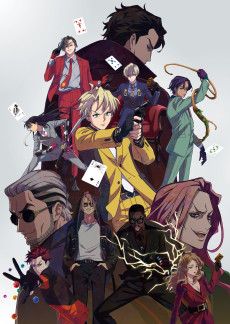C: THE MONEY OF SOUL AND POSSIBILITY CONTROL
STATUS
COMPLETE
EPISODES
11
RELEASE
June 24, 2011
LENGTH
22 min
DESCRIPTION
The Japanese government was rescued from the brink of financial collapse by the Sovereign Wealth Fund. For its citizens, however, life has not improved and unemployment, crime, suicide, and despair are rampant. Kimimaro, raised by his maternal aunt after the disappearance of his father and the death of his mother, is a scholarship student whose only dream is to live a stable, ordinary life. One day he meets a man who offers him a large sum of money if he will allow his "future" to be held as collateral. From then on his fate is radically altered as he's drawn into a mysterious realm known as the Financial District, where he must compete in weekly tournaments called "deals" in order to keep his money and avoid losing his future.
(Source: Wikipedia)
CAST

Msyu

Haruka Tomatsu
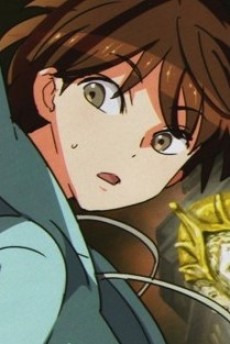
Kimimaro Yoga

Kouki Uchiyama

Souichirou Mikuni
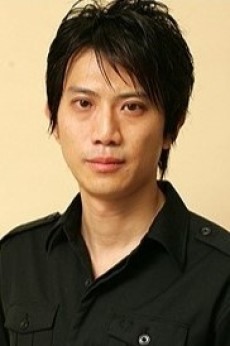
Daisuke Hosomi

Masakaki

Takahiro Sakurai

Q

Saori Gotou

Jennifer Satou

Mayumi Asano

Hanabi Ikuta

Yui Makino
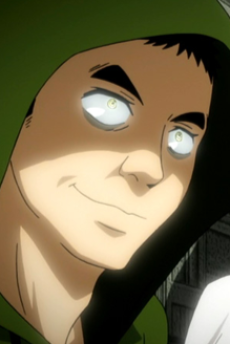
Shigeomi Takedazaki
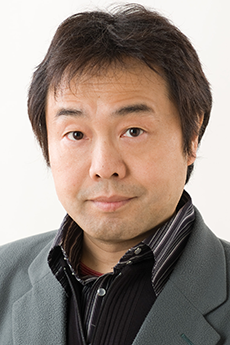
Masami Kikuchi

Takako Mikuni

Saori Gotou
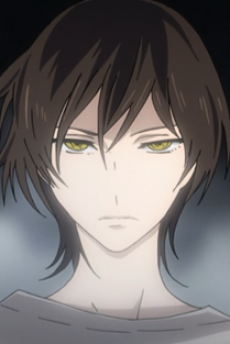
Kou Sennoza
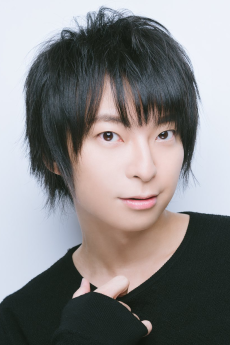
Tetsuya Kakihara

Kyouko Sawamura
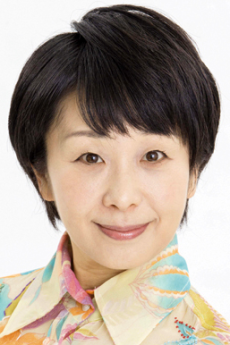
Misa Watanabe

Daisuke Ebara

Nobuo Tobita

Shimada

Bin Shimada
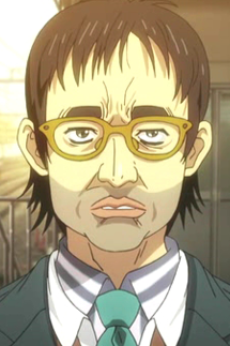
Naoya Makita

Hiroki Yasumoto

Itaneda

Yuuji Mitsuya
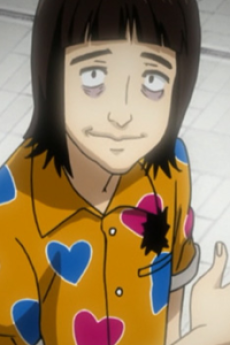
Horii Ichirou

Naozumi Takahashi

Masafumi Mikuni

Naoya Uchida
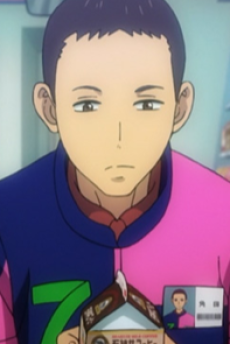
Tsunoda

Ryouhei Kimura

Ebara's Wife

Umeka Shouji
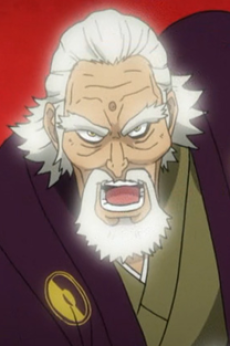
Yoshiyuki Kikuchi

Tomomichi Nishimura
EPISODES
Dubbed
REVIEWS

TheRealKyuubey
40/100It's ambition far outpaces it's brain.Continue on AniList“Why hello there… I’ve been watching you for quite a while. You work so hard, balancing your responsibilities at work with your responsibilities at home… I can’t imagine having to deal with the crippling irony of spending so much time pulling overtime for extra money to support your children, only to have them complain that you’re not home enough to spend time with them. What’s that? Oh, right, I forgot. My name is Masakaki, and I’ve come here to offer you a wonderful opportunity. How would you like to have all the money you could ever need? You’d never need to work a day in your life again… Well, maybe a little, to keep up appearances. If you’d like to solve all of your problems and improve your quality of life once and for all, then come with me to the Financial District, a world where an ambitious soul such as yourself can earn as much money as you want with little effort… Oh, but of course, there’s a catch. You’ll have to succeed at the expense of your peers, putting your money up against theirs… And offering up your future as collateral. So, my new entrepreneur… What will it be?”
Now, if I were you, I would think twice before taking Masakaki’s offer, because this entrepreneurial El Dorado really isn’t what it seems at the outset. As a resident of the Financial district, a separate plane of reality whose influence on our plane is disturbingly obvious, you’ll be gambling with more than just your net worth, or even just your life. You’ll be given a small fortune right at the start, along with an asset… Your own personal battle monster to fight other entrepreneur’s battle monsters on your behalf. They’ll be the ones taking a Stand for you as you encounter a wide array of both entrepreneurs(called Entres for short) and their Assets as well. One such Entre is Yoga Kimimaro, a college student who works himself to the bone to support himself, paying for tuition and rent with his wages.He seems to have developed this weird idea that Assets are people too, and he has a hard time making decisions as he seems compelled to do the right thing, and yet he’s proven himself a force to be reckoned with. Will he be able to defend Japan against the District’s secret threat, or will this Entre receive his just desserts?
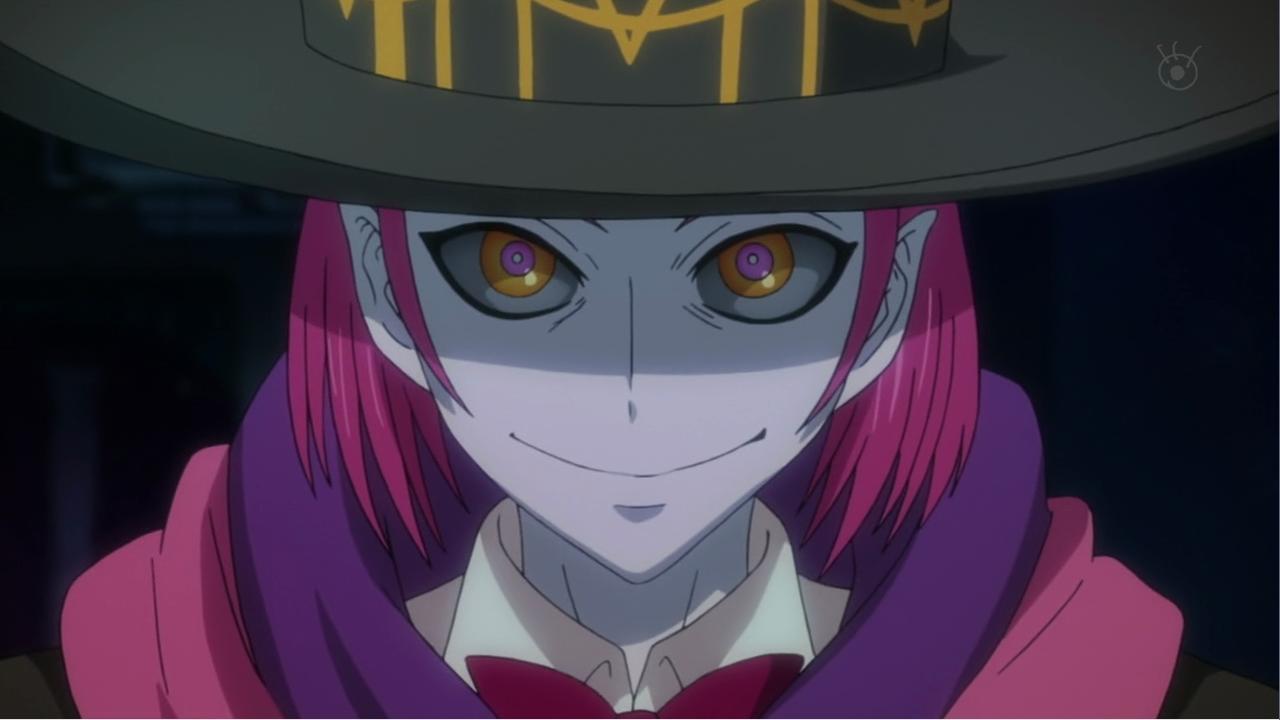
Today’s anime offering is brought to us by Tatsunoko Production, a company that’s somehow been around since the sixties without making much of an impact along the way. That’s probably an exaggeration, seeing how I’m not personally up to date on the history of Japanese pop culture, but with the exception of Speed Racer, Irresponsible Captain Tylor and the Gatchaman franchise, I haven’t heard of almost any of their properties. Maybe it’s all just too obscure for me, and for that reason I really can’t get a grasp on what their work tends to look like on average, but C is one of their more high-profile titles, even if it’s name makes it really frustrating to look up online. At the very least I’ve seen Gatchaman Crowds, so I feel like I do have some idea of what their modern works look like, and that’s a good comparison to make, as the visual aspects of Crowds were one of it’s major redeeming factors after it started to get bogged down by all of it’s deeper problems.
Much like Crowds, C tries out a blend of two-dimensional and three-dimensional animation and art styles, The traditional animation is your standard fare… It’s a little above average, the animation is just smooth enough to please the eye with clever editing to act as a crutch whenever it can’t. There’s a lot of attention to detail in the characters’ movements, and while I couldn’t really point to any of it being flashy, it carries a very subtle level of quality. Tatsunoko clearly know how to utilize shadows, and they seem to have a gleeful time proving it with a lot of smart lighting choices. As for the 3D animation, it’s really going to come down to a matter of personal preference. I’ve heard some people say that CG animation in anime is really jarring, and it makes the characters look really creepy, but personally, I love it. I loved it in the dancing scenes in Love Live, and I especially love it here.
Specifically, the divide between 2D and 3D animation is drawn very deliberately, to highlight the differences between the real world and the financial district. When we see Masakaki talking to someone to entice them into signing over their futures, you can immediately tell that he’s not of this world due to the uncanny valley effect of his animation. It’s a little stilted, but that just adds to the effect. It’s also a little inconsistent, but not to a majorly noticeable or bothersome degree. There are some shots in the Financial district that look a little odd, but for the most part, the visual effects in this alternate world are stunning, like the slow pixelated dissolves and the digitized action sequences. Don’t get me wrong, the backgrounds and set pieces in the real world are highly detailed, but the interior of the District is immaculate and brimming with creative design, even though I personally didn’t see any big drops in quality to compensate for it. I haven’t seen very many shows that offered such a seemless blend of the two styles, which is pretty impressive considering this show came out in 2011.
The music, composed by Taku Iwasaki, is a bit hard to pin down, and from what I’ve heard, that’s pretty common for his work. That’s not to say C has a bad score, but it can get pretty distracting when you have techno effects in a track that also includes a greek choir. The worst part is probably when he tried to emulate his previous success with the soundtack to Gurren Lagann by including English rap tracks… Yes, actual English… But even though it doesn’t sound like it has any translation issues, it still sounds pretty bad. The opening, Matryoshka by Nico Touches the Walls, is a lot simpler and easy to listen to, although that doesn’t necessarily make it the best track in the series. Is’ a traditional J-rock track with beautiful visuals that depict not only the plot and characters of the series, but the importance of currency throughout the history of humanity and our culture. The closing theme, RPG by School food Punishment (Seriously, how do they come up with these band names?), is more true to form for the series, even though the visuals are a bit bland.
The English dub was produced by Funimation, and since it had a good writer on staff, the apt Monica rial, it’s a pretty damn strong one. Brina Palencia and Todd Haberkorn don’t have that much to do in the main roles of Yoga and Mashu, as they really don’t have to tweak their voices or anything strange like that, with the exception of all the voice effects for battle that they had to do. For the rest of the show, they keep to a grounded and subtle register, and it isn’t until the stakes are raised in the second half of the series that they really have to do anything dramatic, and of course, being seasoned veterans, they’re more than prepared for this. They’re likeable and speak naturally for the remainder, so I really don’t have any complaints about either of them. Far more impressive is J Michael Tatum, playing a veteran entre with a dark past motivating him to some mysterious goal. We get the standard Tatum performance, that sly, smooth voice that’s almost enchanting enough to make an exposition dump sound palatable, but there’s also a barely disguised sense of malice and righteous vengeance lying under the surface.
Much like Brina and Todd, Cherami Leigh doesn’t have much to do, but she’s still perfectly likeable as Yoga’s initial love interest, and while you won’t be expecting much from her, there are dark turns she has to take towards the end, and Cherami portrays it all flawlessly. Monica rial does her Monica Rial thing, and it is of course nice as usual, and Sonny Straight has a lot of fun sliding into the slithery shoes of Takedazaki, a bat-shit crazy information exchange broker. The star of the dub is… Well… Fuck, I really don’t want to talk about this guy again, but it’s Scott Freeman. I remember praising this actor before in Yamada’s first time(the DVD of which he actually autographed for me at a convention), and I’m sure I’ve mentioned him in some other reviews I don’t feel like looking up, but all of that was BEFORE he got arrested for possession of child porn, a charge he plead guilty to. It pains me to say this(but not as much as the fact that I actually shook his hand), but he put on an undeniably solid performance as the otherworldly Masakaki, playing him as a sort of joker-esque fop. Yeah, if you don’t want to have to face the moral dilemma of enjoying the work of a pedophile, stick to the sub. Otherwise, the dub is pretty awesome.
If you’ve heard of this anime, who’s full name is actually C: Money of Soul and Possibility Control(even though Edgy Digimon would have been easier to google), you’re probably aware that it doesn’t have the best reputation. That’s one of the reasons I was wary to try it out, until it was requested by a friend of mine in a roleplay group. Honestly, though, I thought it got off to a pretty good start. It doesn’t take long to realize that this is a concept anime, one that’s built around a central idea, and to it’s credit, that concept is pretty strong. In an alternate plane of existence, specially selected people are given fighting avatars and are able to take control of a secret economy that directly effects that of the real world by letting them both win and lose massive amounts of what might be the world’s most well-disguised counterfeit money. There are a lot of rules that go along with this game, as well as a lot of details, conditions and repercussions, and I had a lot of fun learning about all of it. If you’re going to explain a concept in a story, it’s best to have a cypher character to stand in for the audience, and this was done pretty well.
You can draw a lot of metaphors out of this concept, although I doubt very much of it was intentional. The stock market comparison isn’t a subtle one, but it’s still pretty smart and insightful with how it’s used. You could also draw out an allegory for the temptation of magical solutions over hard work, but if I’m being honest, Key the Metal Idol did this way better, and that was just in a single scene. If you were to REALLY stretch it, you could also draw some comparisons to bitcoin, but that would mostly be for fun, as I highly doubt they had that in mind. It’s not dripping with depth, but it has just enough substance to make the concept feel appealing, and of course all of the action and fight scenes don’t hurt either. The details we’re given about this world are given out at a nice, pleasant pace, even as the series goes to some darker places than you were expecting, and several of the assumptions you’d been making about this world and it’s rules turn out to be disturbingly incorrect. When you first get a glimpse of what happens when someone’s collateral future gets taken away from them is crushing to say the least.
Well, it SHOULD have been crushing, but the lack of impact you’ll feel over it is almost as disquieting as the lack of impact the characters feel about it. The major drawback from focusing so much time and story on the inner workings of the Financial district turned out to be a distinct lack of emotional resonance, part of which is the show’s underwhelming characterizations. The most obvious example of this is the main character Yoga, whose usage as a cypher never really evolves into anything else other than good-guy boy scout who wants to do the right thing. The only interesting element of his character is his frugality, as he takes every opportunity to save his money in order to invest in his future, but this element fades after only a few episodes. His asset is even worse, as she pretty much plays the egregious female role of love-interest-doggy, her entire character revolving around growing more trusting and bonded with Yoga over time, which is a common archetype in anime, but it’s particularly awful here.
Much like Asuna from SAO, whom I also compared to a dog, Mashu’s only defining characteristic is her relationship with a more important male character, but it’s even worse here because she also took a dose of magical girlfriend fluid to the arm. “Master, what is food? What is taste? What’s a kiss? Master, I think I love you!” Yeah, they tried to do a romantic sub-plot for these two, and it’s about as painful as the tsundere vibes between Rika and Renamon would have been if they’d been fully realized and not just hinted at. Yoga does nothing to earn Mashu’s feelings other than bring her a cup of instant noodles, because apparently it’s SO weird for Entres to be nice to their assets. Not only is the evidence for this really weak, but hey, not everyone has an Asset that looks like a half-naked teenage girl. Nobody’s flirting with their ogre and giant wolf Assets, but that doesn’t make you a hero for having a sexy demon to talk to. Oh, and I don’t want to spend much time on this, but the reveal involving her and Yoga’s Dad goes absolutely nowhere.
“Oh,” but I hear you say, “what about Soichiro Mikuni?” Well, what about him? Everything about him, from his motive to his plan, was fucking stupid. We’re given his backstory in the worst possible way, as he dumps a ton of exposition on us, talking to literally us to explain everything, which is lazy and unimaginative at best. I get that his father was being a dick, and that the nature of his dickishness COULD give somebody a cynical attitude towards the economy, but his story honestly feels weakened by the fact that his sister doesn’t actually die… She’s just in a coma, but Mikuni’s attitude is so vengeful it’s like he already lost her. You would think that with all the money he’s making in the district he’d be happy just to use it to keep her on life support and in the best conditions possible in hopes that she’d wake up someday, but no, that’s not what he’s doing at all. Get this: The last thing she said before going into her coma was that she wished this moment could last forever, so his idea is to destroy the future and stop time. Except no, that’s not how time works. Tomorrow is still tomorrow, and shouldn’t sacrificing decades of your future work against the idea of your sister waking up?
Okay, I don’t recall if that’s exactly if that’s how everything went down. I did finish this show way back in… Three fucking days ago. All things considered, I’m surprised I remember as much as I do. You can’t really blame me, though, as this anime goes completely off the rails about halfway through, raising it’s stakes to unbelievable levels that you will literally not believe. Yeah, someone losing their future might make their children disappear, or ruin their friends’ lives, but as an economical crisis begins to loom in the last few episodes, people begin dropping like flies, disappearing into digital nothingness. Their ties to the futures of different Entres pretty much turns them into vaporware. I found a lot of this hard to follow, so it might be my fault for not being smart enough to piece everything together… I’m no economics expert, after all, and a lot of the more important details about the Financial District are left intentionally vague, but there was something that happened towards the end that makes me think I’m not actually mistaken.
For a while, I was planning to look up a detailed explanation of how everything worked, how the ending was built up, what was happening with the money, etc. It couldn’t all be superfluous made-up bullshit, could it? But then I realized that yes, yes it fucking could. Not only do people and buildings start getting erased from reality, but also ENTIRE LAND MASSES. We see a few island countries getting erased from the map… Nothing that exists in our world, of course… But the logic of this is just mind-boggling. So the Financial District was able to alter the geography of the planet? How? Did it add water to fill in the voids left by the land it took? Did the sea levels change? Did the entire history of those land masses dating all the way back to Pangaea get rewritten? Did the prehistoric creatures that roamed them get erased from the fossil record, also erasing anything they evolved into? And hey, why not take away any land-locked countries? Didn’t want to stretch the suspension of disbelief too far?

C: Money of Soul and Possibility control is available from Funimation. You can watch it for free on their website, as well as for a decent price on Amazon as part of the S.A.V.E. collection.
I’d just like to take a moment to once again emphasize that this show did get off to a fairly good start. I could tell right from the beginning that it wasn’t destined for greatness, but it was at least interesting when it wasn’t trying to do anything other than provide a Digimon rip-off with a cool backdrop. Unfortunately, it’s ambition far outpaced it’s brain. It’s biggest problem is easily the fact that it wanted you to think, but it was way better off if you didn’t. The laws of cause and effect are thrown out the window in favor of increased stakes, and if that’s not bad enough, I haven’t seen a main character that was this disconnected from the tragedy they were supposed to prevent since Evangelion. It’s a nice enough looking show, and I did enjoy it for a little while, but at only 11 episodes, I feel like things could have been set up and developed to the point where I could have actually cared about it. As it is, it’s pretty bad, but it’s a unique enough idea that I can understand why people still remember it six years later. It’s just too bad that it lost control of the positive qualities it had. I give C: money of Soul and Possibility Control a 4/10.

ThyMrMan
50/100Rushed mess, ton of wasted potential. Honestly not much going for it.Continue on AniListI would love to know what happened with this show. It feels like a 24 episode show, that was cut and butchered with a dull blade down to 11 episodes. So much is missing and lost, and for once I can’t blame adaption. Somewhere buried in the mess it a good concept and enjoyable characters, and in general a unique idea I haven’t seen done before. The execution of that though is just poor.
As with many rushed shows, it starts good. The pacing in the first couple episodes work out well, and it feels like it has a chance. You are intrigued by the Financial District they build, the characters crafted, and this large impressive story. And one by one they fall apart under the stress of wrapping up all up neatly in 11 episodes.
The cast of characters fall into two camps it seems. Caring only about the present at the cost of all else, and caring only for the future at the possible cost of the present. Both sides take insane bets in hopes that things work out in their favor, and if one thing went wrong it would have completely ruined both parties. Their beliefs in the show could never function in parallel. Or, at least this is the feeling I got from the show. Because, due to the rushed nature of the show I never got a proper explanation that I would have liked. The characters will do something, you see a big number representing money go up or down, and a quick montage of things changing in the real world. And then the characters automatically know what happened following the change and react to it in real time, don’t know how.
Now outside of just goals and beliefs, I think they were fine. I don’t believe I will remember any of them, and definitely won’t remember their names or design. They did come off a tad generic and boring, and for some like Mashu they leaned heavily into tropes.
Onto the story I guess, this is a mess. And a mess of their own creation. They had a ton of content to use, so many story lines and development of the world and characters and interactions between factions and such. Just none of it gets properly developed into something I would call great, or even decent. How does the Financial District interact with the real World? What is the Financial District? Who controls all of this really? And how does this Financial District have so much power over nature, with the ability to cause World changing events. I almost want to say the entire thing is a computer simulation, none of this was real, and things just happen because some bored programmer is playing with some files.
Visually I would call the show poor. It had a decent mix of pure CGI and traditional artwork. And the split is unavoidable bad, with the CGI just looking so very dated. While also not really taking advantage of the CGI when used. I never understand why companies use CGI in this way. If you want to use CGI, have it compliment your existing artwork and style, not completely replace it. Not unless you are one of the few cutting edge CGI studios.
The strongest point of the show by far is the music. Really has a good sound track, good enough I can see adding some songs to one of my regular mixes.
Overall, a disappointing anime original. Somehow they managed to make an original rushed,, and if they had given it more time it probably would have been something amazing. But as it stands, there isn’t much here to love.

seanny
69/100The wonkiest anime ever made; smuggling finance/macroeconomics allegories through digital monster duelsContinue on AniListFirst of all, a side note on the name. The actual name of the series is 『C』, sometimes with the subtitle, The Money of Soul and Possibility. The “C” stands for “Control”; its working title before a trademark issue with an ongoing J-drama. “Possibility Control” is a misreading of some varieties of the anime’s logo. Unfortunately, this misreading made it into virtually all anime databases.
Kenji Nakamura is the king of “passable anime that comes to my mind a lot”. Bakeneko and Mononoke are widely acclaimed with its stunning aesthetics and deep criticisms of conservative Japanese culture, but the bookworm-salaryman-turned-anime-creator also directed a string of lesser-known TV anime on wonky topics such as digital democracy and mental illness. C is his urban-fantasy-action series about finance & macroeconomics.
Imagine.
In the aftermath of the Lehman Shock and the subsequent Great Recession, Nakamura got it in his head to make something on the subject, and interviewed like two dozen people — economists, financial journalists, NPOs, and CEOs — and conceived a mf’ing monster battle anime as the conduit for all this esoteric knowledge.
In it, a downtrodden college student makes a deal with the devil who whisks him away to a demonic other-world where one can magically liquidate their future happiness for cash-on-hand in the real world. Others like him enter their demonic familiars in zero-sum duels. Bankruptcy in this desperate "economy" means certain death in the real world when the devil claims his due.
The thinly-veiled metaphors don’t end there. We meet the true antagonist of the series: the leader of an all-powerful guild who fixes the majority of the games to minimize negative outcomes for all in the realm. With his dominance of the demon market, he cashes out his significant demon-wealth to prop up the faltering Japanese economy. However well-meaning the act, the plan all but ensures Japan’s gradual demise by trading its future to save its present.
In real life, Japan’s debt-to-GDP ratio is an obscenely high 214%; it has literally traded the future to prop up the present to a much greater degree than other developed nations. It’s the birthplace of the term “corporate zombie”; unprofitable businesses that pointlessly persist with state subsidies, and with its demographics heavily skewed toward the elderly, Japan is in many ways a harbinger of things to come (or already arrived) for the rest of us: high debt, low growth and politics that favor the old.
Our college student protagonist challenges The Man in the ultimate showdown between generations. The prize: control of the demon-currency printing press. C suffers the same issues of all of Nakamura’s post-Mononoke works: delirious visuals and over-the-top (though true to anime) schlock that wildly over-compensates for what’s assumed to be uninteresting subject matter. Nothing he’s made recaptures the confident swagger of his debut. That said, the mere attempts to convey a wonky, non-otaku topic in a marketable TV anime each carry their own “Hataraku Saibou”-like charm, however wobbly the results are.
In an interview, the director says that he sees Japan as leaderless, and the result of indecision is an ongoing status quo of “poverty and stability”. In the anime, our protagonist forces the issue with monster battling and macroeconomic magic, but in real life, political change is far from easy. It follows that Kenji Nakamura would later make a two-season meditation on democracy itself called Gatchaman Crowds.
Postscript: This review was originally written in 2020 as part of my Passable Anime that Comes to My Mind A Lot series.
SIMILAR ANIMES YOU MAY LIKE
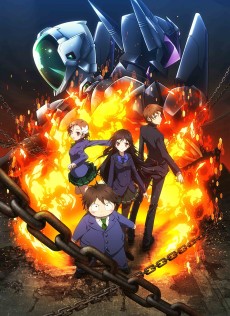 ANIME ActionAccel World
ANIME ActionAccel World ANIME ActionMirai Nikki
ANIME ActionMirai Nikki ANIME DramaHigashi no Eden
ANIME DramaHigashi no Eden ANIME ActionDarwin's Game
ANIME ActionDarwin's Game ANIME ActionInfinite Dendrogram
ANIME ActionInfinite Dendrogram ONA ActionDestiny Child
ONA ActionDestiny Child ANIME ActionGuilty Crown
ANIME ActionGuilty Crown ANIME ActionDeatte 5-byou de Battle
ANIME ActionDeatte 5-byou de Battle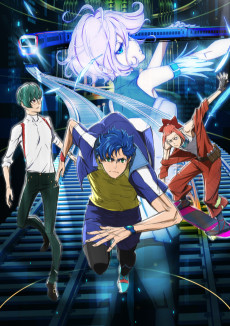 ANIME MysteryTokyo 24-ku
ANIME MysteryTokyo 24-ku ANIME ActionSabikui Bisco
ANIME ActionSabikui Bisco
SCORE
- (3.35/5)
TRAILER
MORE INFO
Ended inJune 24, 2011
Main Studio Tatsunoko Production
Favorited by 463 Users



